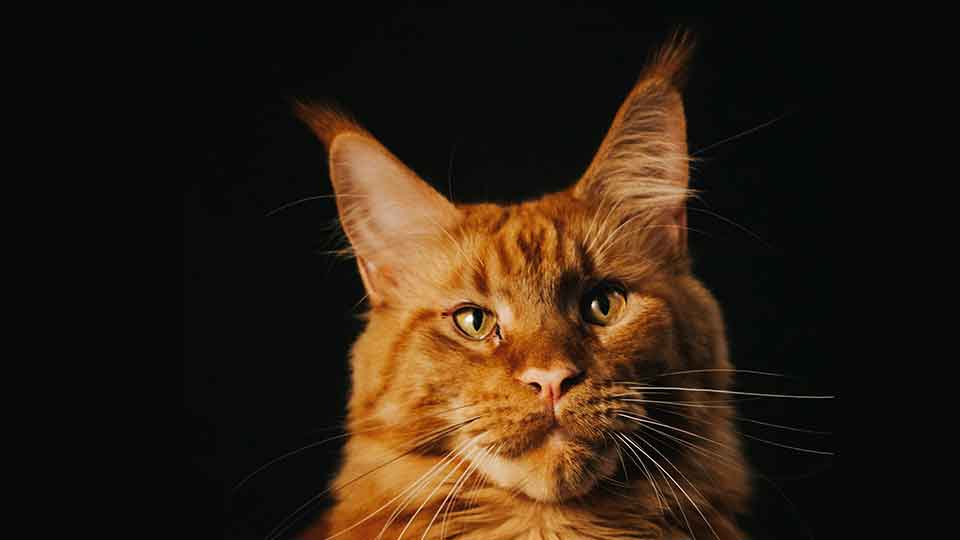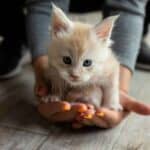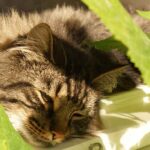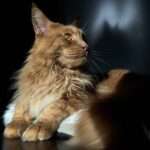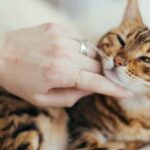Unlike the breed’s general history, the history of the Orange Maine Coon is less distinct.
The orange coloration in cats is a result of a specific genetic trait.
The gene for the orange color is carried on the X chromosome.
When present, it creates an orange or “red” color in the cat’s fur, hence the name “Red Maine Coon” used in cat fancy circles.
This gene has been present in the feline population for centuries, and so orange or red Maine Coons have likely been around as long as the breed itself.
Are Orange Maine Coon Cats Rare?
Orange Maine Coons aren’t exactly rare, but they’re far from the most common color you’ll find in this breed.
They’re cherished for their vibrant, warm color, which sets them apart and gives them a distinctive appearance.
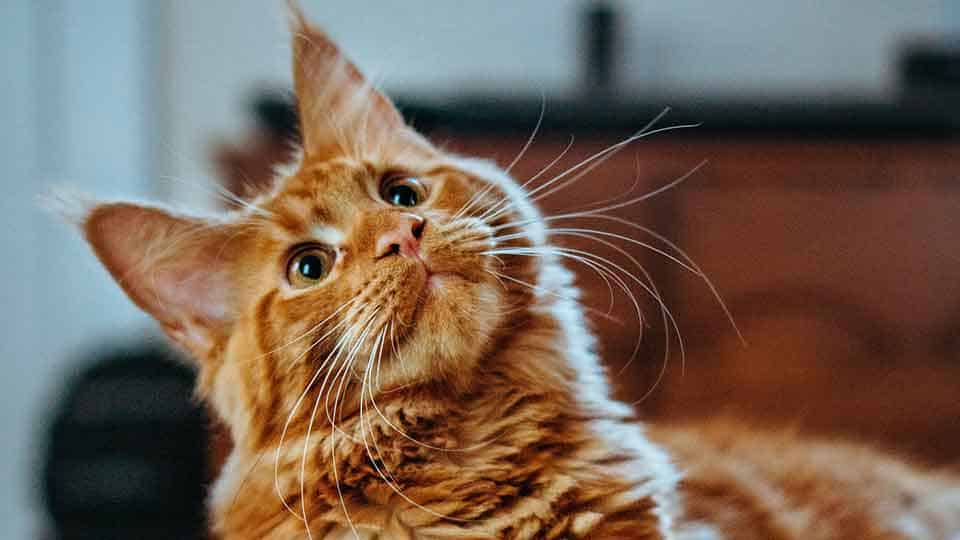
What Are Orange Maine Coon Cats Called?
While we often refer to them as “orange,” in official terms, these cats are called “Red Maine Coons.”
The term “red” in cat genetics refers to what we typically call orange.
So, don’t be surprised if you see an Orange Maine Coon listed as “red” by breeders or in cat shows.
Fascinating Facts About Orange Maine Coon
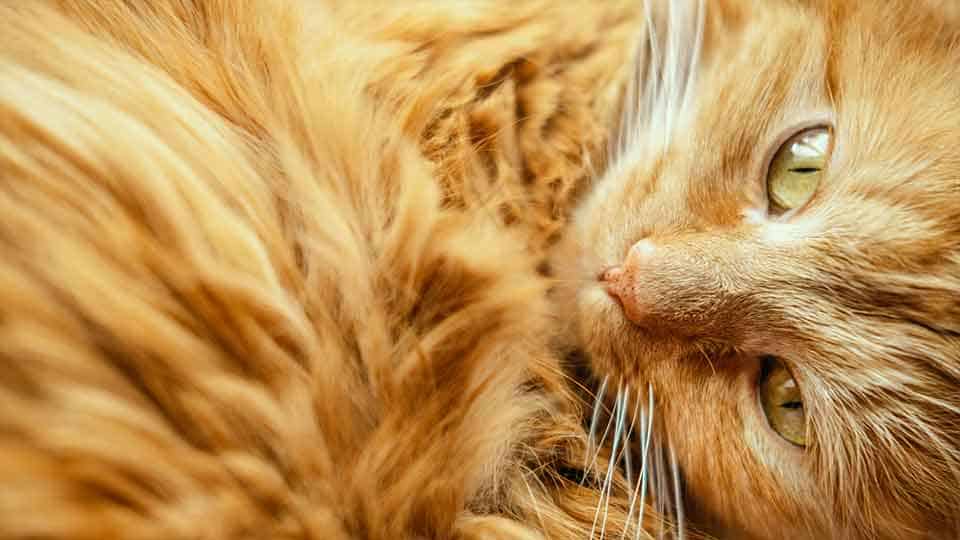
Image credit: Nataliya Smirnova
- Striking Appearance: Orange Maine Coons are visually stunning. Their vibrant, fiery coats can range from a light, creamy orange to a deep, rich red. My cat’s fur, for example, is a wonderfully warm, marmalade color that looks absolutely radiant in the sunlight.
- Unique Patterns: Their coats can come in various patterns, including classic, mackerel, ticked, and tortoiseshell. Each pattern offers a unique aesthetic, making every Orange Maine Coon uniquely beautiful.
- Eye Color Variety: Orange Maine Coons can have a wide range of eye colors. You’ll often see green, gold, or copper eyes, but they can also have blue or odd-colored eyes (each eye a different color), although that’s less common.
- Genetics: The gene for the orange color in cats is located on the X chromosome. As such, male cats, which have one X and one Y chromosome, can either be orange or not, but females, having two X chromosomes, can be orange, not orange, or tortoiseshell (a mix of orange and non-orange).
- Sunbathing Buddies: Orange Maine Coons love to lounge in the sun, and when they do, their fur can look like it’s literally glowing. Just be aware that they can get sunburned, especially on their ears, so it’s important to ensure they have shaded areas available.
- Orange Maine Coons are Social: Like all Maine Coons, the orange ones are also known for their friendly and sociable personalities. They’re great with children and other pets, making them excellent family cats. Tigger, for instance, gets along well with everyone he meets.
- Longevity: Orange Maine Coons, like their Maine Coon brethren, tend to be a healthy, long-lived breed. With proper care, they can live up to 15 years or more. My Tigger is currently nine years old and is as playful and energetic as ever.
Related: Maine Coon 101: All You Need to Know about Maine Coon Cat
What’s the Color of Orange Maine Coon?
The color of an Orange Maine Coon, often referred to as a “Red Maine Coon” in cat fancy circles, can range from a pale, creamy orange to a deep, rich, reddish-orange or even a vibrant, fiery red.
The term “orange” in cats is a broad description, covering a variety of shades.
These cats may have a solid color or showcase various patterns on their fur. The patterns can include:
- Classic tabby: This pattern is characterized by swirling patterns on the side of the cat, often in a target or bulls-eye shape.
- Mackerel tabby: The cat’s body has vertical, gently curving stripes on the side of the body.
- Ticked tabby: In this pattern, individual hairs are banded with different colors.
- Tortoiseshell: Also known as “torties,” these cats have a patchwork of orange and black (or blue and cream in dilute versions).
It’s also worth noting that the intensity of the orange color can change with the seasons.
In the winter months, the coat may darken, while in the summer, the coat can become lighter or more faded.
The color of an Orange Maine Coon’s eyes can vary too, ranging from green, gold, or copper. In rare cases, they can have blue or odd-colored eyes (each eye a different color).
So, while we might call them “Orange Maine Coon,” these cats can showcase a spectacular array of shades and patterns, making each one uniquely beautiful.
How Do I Know If My Orange Cat Is a Maine Coon?

Image credit: petrebels
Identifying a Maine Coon involves looking at several physical characteristics and personality traits.
Maine Coons are generally large cats with muscular bodies, broad chests, and long, bushy tails.
Their heads are medium-sized with a square muzzle, large, tufted ears, and high cheekbones.
They also have a characteristic “M” marking on their foreheads.
In terms of personality, Maine Coons are friendly, intelligent, and playful.
They are known for their dog-like behavior, such as playing fetch and following their owners around the house.
Keep in mind that while your orange cat may have some of these traits, only a DNA test can confirm if your cat is a purebred Maine Coon.
How Big Are Maine Coon Cats?
Maine Coon cats are one of the largest domesticated cat breeds.
Males typically weigh between 13-18 pounds, while females are slightly smaller, usually weighing between 8-12 pounds.
However, they can sometimes be even larger. Their size, dense fur, and large bones give them their characteristic “big cat” look.
How Much Does An Orange Maine Coon Cost?
The price of an Orange Maine Coon can vary depending on several factors, such as the breeder’s reputation, the cat’s lineage, and the demand for Maine Coon cats at the time of purchase.
On average, you can expect to pay anywhere from $800 to $2000 for a kitten.
Adult cats from rescue centers are typically less expensive.
When I got my cat, she was just a kitten, and I paid around $1200 for her from a reputable breeder.
It’s important to note that while the upfront cost may seem high, the love and companionship these cats offer are priceless.
Related: Maine Coon Breeders: How to Get A Maine Coon Kitten
How Do You Take Care of A Maine Coon?
Maine Coons are a hardy and easy-going breed, but like any pet, they require specific care to keep them healthy and happy.
Here are some tips on how to care for a Maine Coon cat:
- Nutrition
Maine Coons need a balanced diet of high-quality cat food to maintain their overall health. Because of their large size, they may eat more than the average cat. It’s essential to provide them with enough protein and avoid overfeeding them, as they can be prone to obesity.
- Hydration
Ensure that your Maine Coon always has access to fresh water. Some Maine Coons prefer running water, so you might want to consider getting a cat water fountain.
- Grooming
Maine Coons have long, thick fur that needs regular grooming to prevent matting and hairballs. Brushing them a few times a week with a steel comb should suffice. They are generally good at grooming themselves but can use a little help, especially in hard-to-reach areas.
- Dental Care
Like all cats, Maine Coons can be prone to dental issues, so regular dental care is crucial. Brush their teeth frequently using cat-safe toothpaste to prevent gum disease and other oral health problems.
- Exercise
Maine Coons are active and playful, so they need plenty of physical and mental stimulation. Provide a variety of toys and engage them in interactive play sessions. Cat trees, scratching posts, and puzzle toys can all help keep a Maine Coon entertained.
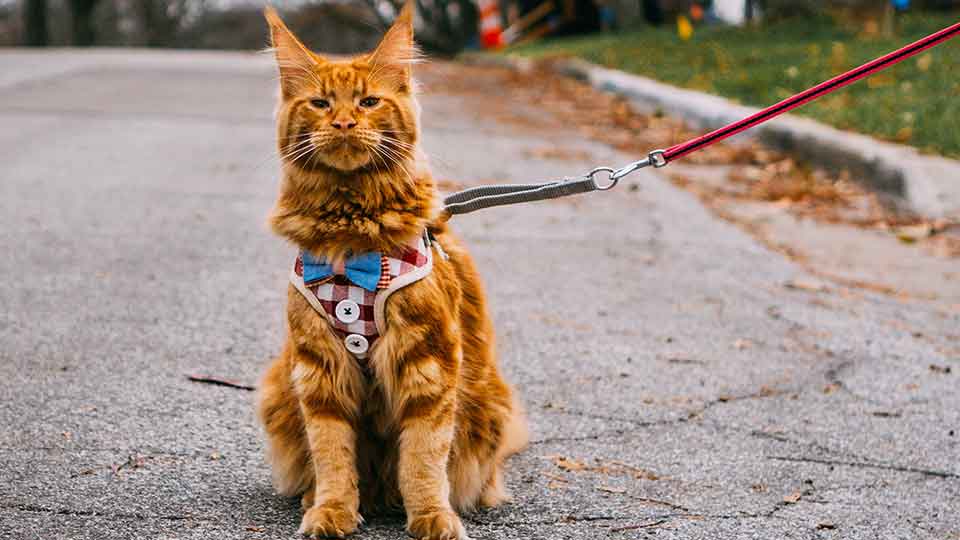
- Regular Vet Check-ups
Regular veterinary check-ups are essential for monitoring your Maine Coon’s health. Maine Coons can be prone to certain genetic health conditions, like hip dysplasia and hypertrophic cardiomyopathy (HCM), so it’s crucial to have regular vet check-ups to catch any potential issues early.
- Social Interaction
Maine Coons are social cats who enjoy human interaction. They thrive on companionship and can even get along with other pets. Spend quality time with your Maine Coon to keep them happy and well-adjusted.
- Training
Maine Coons are intelligent and can be trained to do tricks, use a litter box, and even walk on a leash. Use positive reinforcement techniques like treats and praise to encourage good behavior.
- Safety
Maine Coons are curious and adventurous, but it’s best to keep them indoors to protect them from dangers like traffic, predators, and disease.
If you do allow your Maine Coon outside, ensure it’s a secure and monitored environment.
Related: How to Prepare for A New Maine Coon Cat: the 2023 Cat Essential Checklist
Remember, every cat is unique, and your Maine Coon may have specific needs or preferences.
Always observe your cat’s behavior and adjust your care routine as necessary.
And most importantly, shower your Maine Coon with love and affection, because that’s what they’ll give you in return!

Orange Maine Coons, with their striking looks and endearing personalities, are truly exceptional cats.
They are beautiful to look at and have a temperament that makes them a joy to live with.
Their friendly and playful nature makes them great for families with children and other pets.
And their unique orange coloring adds an extra layer of intrigue to an already fascinating breed.
Having my beloved cat in my life has enriched it in ways I can’t describe.
Whether chasing after a toy mouse, lounging in a sunbeam, or curling up next to me on the couch, she adds a touch of warmth and vibrancy to my day.
If you’re considering adding a feline friend to your family, I can’t recommend Maine Coons enough, whether they are orange or not.
They’re more than just pets; they’re companions, confidants, and a source of endless joy and entertainment.
Related Post:

